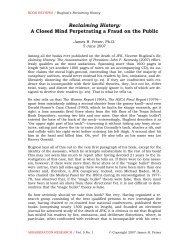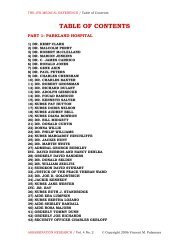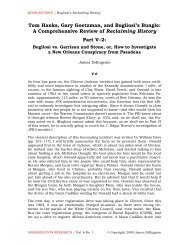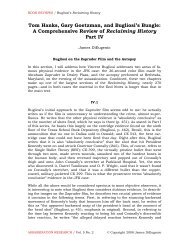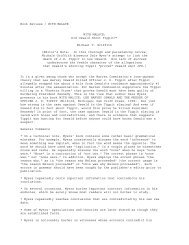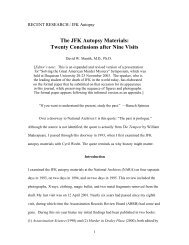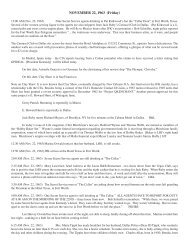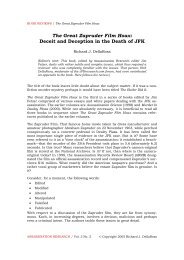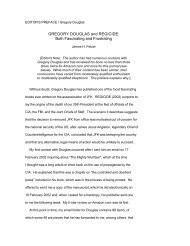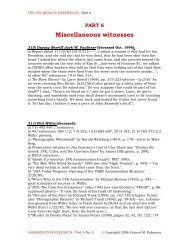A Comprehensive Review of Reclaiming History Part VIII
A Comprehensive Review of Reclaiming History Part VIII
A Comprehensive Review of Reclaiming History Part VIII
You also want an ePaper? Increase the reach of your titles
YUMPU automatically turns print PDFs into web optimized ePapers that Google loves.
James DiEugenio 28 Bugliosi’s Bungle, <strong>Part</strong> <strong>VIII</strong><br />
who passed to DeLoach an early draft <strong>of</strong> the Warren Report in July 1964. The<br />
FBI added a note to this copy: “There will be a fourth and final draft made<br />
available through a source by July 23, 1964, which will contain the final conclusions<br />
and recommendations <strong>of</strong> the Commission.” (ibid., p. 44) As I noted in<br />
<strong>Part</strong> VII<strong>of</strong> this review, the FBI’s atrocious performance in the Kennedy case centered<br />
almost instantly on convicting Oswald at any price. Ford quickly joined in<br />
that monomaniacal effort.<br />
The year after the Warren Report was issued, Ford published his own book<br />
called Portrait <strong>of</strong> the Assassin. Ford arranged for John Stiles, his first campaign<br />
manager and Nixon’s campaign field director, to be his assistant while on the<br />
Commission. Their book was essentially a rehash <strong>of</strong> the Commission’s view <strong>of</strong><br />
Oswald. It made for dull reading. Consequently, the publisher told them to<br />
spice it up; so they added a section about the report from Texas <strong>of</strong> Oswald being<br />
an FBI informant (see this review, <strong>Part</strong> VII, Section 6). The problem was that at<br />
the time the book was published, the records <strong>of</strong> the Warren Commission executive<br />
sessions were classified. Evidently, Ford had little concern about violating<br />
the law in order to smear Oswald and make a little money in the process. But in<br />
1973, Nixon chose Ford to replace Spiro Agnew as his Vice-President. Ford was<br />
now questioned about his use <strong>of</strong> classified material. He lied under oath about<br />
what he had done: he said he only used material in the Warren Commission volumes<br />
for that book—which he clearly had not. When later exposed, Ford apologized<br />
for his misdeed (Marrs, p. 467). Six months after he became President,<br />
Ford declassified the material in question (ibid.).<br />
While a congressman, Ford developed a reputation for being one <strong>of</strong> the CIA’s<br />
best friends (ibid., p. 466). In 1974, when Nixon resigned under the pressure <strong>of</strong><br />
the Watergate scandal, President Ford immediately began to prove his reputation.<br />
Many people on the Watergate Committee, like Senator Howard Baker,<br />
suspected that the CIA had played a role in that affair, and that Richard Helms<br />
had manipulated the FBI inquiry (Daniel Schorr, Clearing the Air, p. 139). Consequently,<br />
there was a movement to investigate the crimes <strong>of</strong> the CIA and FBI.<br />
Ford gave a speech at the time in which he defended the Agency against the<br />
rumors that they had overthrown Salvador Allende in Chile the year before—<br />
which turned out to be true. When asked if this action was not in violation <strong>of</strong><br />
international law, the new President replied, “I am not going to pass judgment<br />
on whether it is permitted or authorized under international law. It is a recognized<br />
fact that historically as well as presently, such actions are taken in the<br />
best interest <strong>of</strong> the countries involved.” (Time, September 30, 1974). In other<br />
words: Uncle Sam Knows Best. Time commented: “Ford’s words seemed to<br />
represent an anachronistic, cold-war view <strong>of</strong> national security reminiscent <strong>of</strong><br />
the 1950s. Complained Democratic Senator Frank Church <strong>of</strong> Idaho: ‘It’s tantamount<br />
to saying that we respect no law save the law <strong>of</strong> the jungle.’ ” (ibid.)<br />
In late 1974, even more friction came between President Ford and Senator<br />
Church. James Angleton had badly divided the CIA over the Yuri Nosenko affair.<br />
In order to force him to resign as counter-intelligence chief, Director Bill<br />
Colby had given a story to the CIA-friendly Sy Hersh. This story uncovered some<br />
<strong>of</strong> the illegal surveillance operations that Angleton had run out <strong>of</strong> his shop.<br />
When exposed at Christmas time in the pages <strong>of</strong> the New York Times, the story<br />
ASSASSINATION RESEARCH / Vol. 6 No. 1 © Copyright 2009 James DiEugenio



